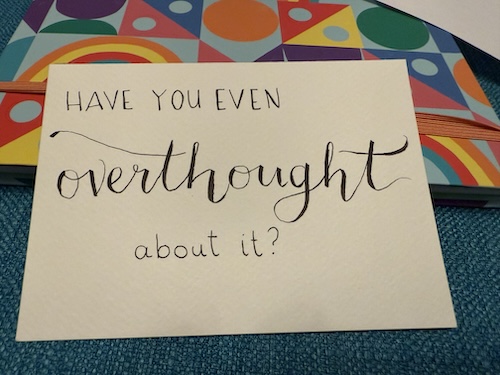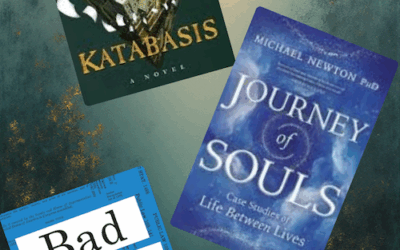
The Curious Self: Finding Freedom in a World of Overthinking
Long-time readers know I used to be a philosophy professor. For eight years, I taught students how to think critically, analyze arguments, and question everything. But when I was ready to leave academia in 2016, I found myself completely stuck.
Turns out, “Why is there something instead of nothing?” and “Do human beings have free will?” aren’t exactly the kinds of questions that help when you’re wondering “Is it time to let go of my big dream and what will take its place?”
So I asked myself a simpler question: What did I want to do before I wanted to be a professor?
The answer surprised me. When I was 13, I thought marketing was cool. I even wrote a career report about marketing in 8th grade (using the card catalog to do my research, because I’m old like that). A friend of a friend was looking for a marketing intern and eventually that led to starting The Pocket PhD.
But here’s the thing—before I left academia, I was trapped in a cycle of overthinking that nearly paralyzed me. And if you’ve ever found yourself stuck in analysis paralysis, unable to move forward because you’re thinking in circles, this post is dedicated to you.
The Paradox of Overthinking
Let’s start with a thought experiment (philosophers LOVE these!). If I tell you not to think about a pink elephant, what’s the first thing you’ll do?
You’re going to think about a pink elephant.
Now, what would your strategy be if I asked you to suppress the thought of a pink elephant as a mental exercise? What if I said I’ll give you $100 if you can go for a whole hour without thinking about a pink elephant?
Here’s the thing: You’re not going to avoid thinking about a pink elephant by concentrating on not thinking about a pink elephant. Your best bet? Get curious and get lost thinking about something else.
This reminds me of the famous marshmallow test—you know, the study where kids were given a marshmallow and told they could have a second one if they waited 15 minutes without eating the first. The kids who did the best weren’t the ones who stared at the marshmallow and used willpower. They were the ones who distracted themselves—who got curious about something else entirely.
The Overthinking Trap
Even though we know that overthinking isn’t helpful, it’s ridiculously easy to fall into the trap. I see this all the time with my business book ghostwriting clients. They get stuck in:
Analysis paralysis. Like my client Drea, who wrote 200,000 words but couldn’t finish her book because she kept second-guessing the narrative arc.
Perfectionism. Like David, who rewrote his final chapter seventeen times because it never felt “expert enough.”
Imposter syndrome. Like Jennifer, who questioned her authority to write about leadership despite having 20 years of experience in the field.
This overthinking always comes from the same place: fear and scarcity mindsets. We’re afraid we’re not good enough, smart enough, or ready enough. So we think harder, longer, and in more circles, believing that if we just analyze the problem enough, we’ll think our way to certainty.
But here’s what I’ve learned: overthinking is the enemy of action. And action is what creates the results we want.
Curiosity as the Antidote
So what’s the solution? Curiosity.
I’m not talking about casual interest or mild wonder. I’m talking about curiosity as an orientation of openness—a willingness to explore without needing to control the outcome.
This whole blog article came about because I got curious about why some of my ghostwriting clients finish their books and others don’t.
In my book, I talk about having a “symbiotic relationship” with your ideas. Instead of trying to force your ideas into a predetermined shape, you collaborate with them. You get curious about where they want to go.
This is also why I encourage my clients to think of their books as “living documents” rather than final statements. When you approach your work with curiosity instead of control, you give yourself permission to discover as you go.
Speaking of getting curious about your ideas—if you’re stuck overthinking what your Big Idea might be for your business book, I can help. My Find Your Big Idea service helps business owners and experts break through analysis paralysis to discover the book idea that’s been hiding in plain sight. Through a collaborative process that emphasizes curiosity over control, we’ll uncover the message you’re meant to share with the world. Learn more about Find Your Big Idea here.
A Curious Exploration Exercise
Here’s something I want you to try with a friend. If you’re reading this with someone else nearby, grab them for this exercise. If not, bookmark this and come back when you can find a partner.
The Curious Exploration Exercise:
- Grab a willing friend
- Take turns asking each other this question: “What feels easy to you that others find difficult?”
- After the initial answer, the listener can only respond with curious questions for 2 minutes
- Switch roles and repeat
What you’ll discover is that curious questioning opens up insights that overthinking never could. When we get curious about someone else’s experience—or even our own—we stop trying to control the conversation and start truly listening.
I’ve done this exercise with dozens of people, and it never fails to surprise them. Curiosity creates connection and understanding in ways that analysis simply can’t.
Finding Your Freedom
The path from overthinking to freedom isn’t about thinking less—it’s about thinking differently. It’s about shifting from a controlling mindset to a curious one.
Here are some practical ways to cultivate curiosity in your daily life:
Ask “what if it works out?” instead of listing all the ways it could go wrong. Most of our overthinking comes from catastrophizing. What if we flipped the script?
Approach projects as experiments rather than final products. This takes the pressure off and gives you permission to learn as you go.
Practice having a “beginner’s mind” even within areas of expertise. Some of my best insights about writing have come from approaching familiar problems with fresh eyes.
When I left academia, I was terrified. I had spent 15 years becoming an expert in ONE thing, and suddenly I was starting over. But curiosity saved me. Instead of overthinking every decision, I got curious about what might be possible.
That curiosity led me to ghostblogging, which led me to starting my business, which led me to helping other experts write their business books. None of it would have happened if I’d stayed stuck in analysis paralysis.
Your Next Step
If you’re reading this and thinking, “Yeah, I definitely overthink everything,” I want you to try one thing this week. The next time you catch yourself spiraling in analysis paralysis, stop and ask yourself: “What am I curious about here?”
Not “What’s the right answer?” or “What should I do?” But “What am I curious about?”
Then follow that curiosity wherever it leads. You might be surprised by what you discover.
Because here’s the truth: The answers we’re looking for aren’t usually found through more thinking. They’re found through more exploring. And exploration requires curiosity, not certainty.
I made a career teaching students to question everything, but when it came to my own life, I was paralyzed by all that questioning. It wasn’t until I stopped trying to analyze my way to the perfect answer and started getting curious about what might be possible that everything changed.
So the next time you find yourself overthinking your business book, your next career move, or that big decision you’ve been putting off, remember the pink elephant. Stop trying not to think about it, and get curious about something else instead.
Your future self will thank you for it.
Image designed and captured by Jill B. Delston.



